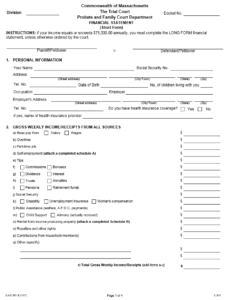Plymouth Probate and Family Court
A Guide for Navigating the Legal System
The Plymouth Probate and Family Court handles important legal matters that affect families and estates in Plymouth County. This court deals with wills, estates, divorces, child custody, and other family issues. Having the right information about the court’s location, services, and procedures can help you effectively deal with these sensitive legal matters. This guide provides an overview of the Plymouth Probate and Family Court and how to navigate common probate and family cases.
Overview of the Plymouth Probate and Family Court
The Plymouth Probate and Family Court serves the communities of Plymouth County, Massachusetts. The court handles probate and family-related cases like wills, estates, guardianship, divorces, and child custody matters.
Location and Hours
The Plymouth Probate and Family Court is located at 52 Obery St., Plymouth, MA 02360. The court is open Monday through Friday from 8:30 am to 4:30 pm.
There is free public parking available at the courthouse. The closest public transportation is the Plymouth and Brockton Street Railway Co., which stops near the courthouse at exit 5.
History and Background
The Plymouth Probate Court was established in 1633, making it one of the earliest probate courts in the United States. It has served Plymouth County for over three centuries, providing continuity and local experience in probate matters. The court operates under the Massachusetts Trial Court system and adheres to state probate laws and procedures. Its judges and staff work to efficiently settle estate matters and provide access to justice for all.
Jurisdiction and Responsibilities
The Plymouth Probate and Family Court has jurisdiction over the probate of wills and administration of estates for individuals who lived or owned property in Plymouth County. Its main responsibilities include:
- Reviewing and approving wills after death
- Overseeing administration of estates
- Appointing executors and administrators for estates
- Settling any disputes over the validity of wills
- Authorizing guardianships and conservatorships
- Hearing adoptions and name change petitions
- Monitoring trusts and charitable funds
In addition, the court provides forms, guidance, and resources to assist people representing themselves in probate matters.
Plymouth Probate and Family Court Services Offered
Services offered at the Plymouth Probate and Family Court include:
- Probate case services: petitioning the court for administration of a will, probating an estate, obtaining guardianship, filing for a name change, etc.
- Family law case services: filing for divorce, determining child custody/visitation, getting child support orders, obtaining restraining orders, etc.
- Access to court records, dockets, and schedules
- Support and information services through the court’s clerk office and virtual registry
Accessibility
The court offers accessibility for people with disabilities through its ADA Coordinator, Laura Hatton. She can be reached at 508-747-8499 or [email protected].
Probate Processes at Plymouth Probate Court
Navigating the probate system often starts with filing petitions and documents at the Plymouth Probate Court. Understanding the key processes can demystify the experience.
Opening an Estate
The probate process begins by opening an estate case at the court. The executor or nearest family member files petitions to start probate and be appointed as the estate representative. The court reviews the will, appoints an executor, and issues letter of authority to act on behalf of the estate.
Appointing an Executor or Administrator
The court formally appoints an executor named in the will or an administrator if there is no will. The executor or administrator sends notice to all beneficiaries, pays debts, files tax returns, and distributes assets according to the will’s directives. The court supervises the executor’s work and requires regular accountings.
Inventory of Assets
The executor or administrator must file an inventory that lists all the estate’s assets and property that will pass through probate. This helps beneficiaries know what is available and provides a record for filing taxes and distributing assets. The inventory must be completed within 90 days.
Paying Claims and Debts
The executor pays valid claims against the estate, including bills, mortgages, liens, and taxes owed. The court requires publishing a notice to creditors and sending notice to known creditors. Creditors must make claims within a set time period or they are barred.
Distributing Assets to Heirs
Once debts and expenses are paid, the executor distributes remaining assets to heirs as directed by the will. If there is no will, assets go to the deceased’s closest relatives according to state law. The executor must get a receipt from each beneficiary and file it with the court to close the estate.
Probate Cases Handled at the Court at Plymouth family court
The Plymouth Probate and Family Court handles all types of probate cases for the county, including:
Probate of Wills
The court handles probating wills and determining the validity of wills left by deceased individuals. It will grant petitions to name an executor of a will and give them legal authority over the estate if the will is found to be valid. The probated will then dictates how the decedent’s assets should be distributed.
Administration of Estates
Even without a will, the court can appoint an administrator to handle a deceased person’s estate and oversee the distribution of assets to any heirs. The administrator files petitions and accounts with the court during this process.
Guardianship
The court establishes guardianships over minors or incapacitated adults who need someone to care for their personal and/or financial needs. Guardians file yearly reports on the status of their ward with the court.
Conservatorship
For adults unable to care for their own finances/assets, the court may appoint a conservator. This gives the conservator legal authority to handle the person’s monetary affairs and make financial decisions on their behalf.
Name Changes
To legally change one’s name, petitions must be filed and approved by the probate court. The court will grant name changes as long as there are good reasons and no intent to defraud creditors or avoid legal obligations.
Family Law Cases Handled at the Court
The Plymouth Probate and Family Court is also responsible for deciding family law cases like:
Divorce
Divorce proceedings are initiated by filing paperwork with the court to dissolve a marriage. The court oversees matters like alimony, property division, child support, and child custody related to the divorce.
Child Custody
Legal decisions about which parent (or guardian) a minor child primarily resides with, child visitation schedules, and modifying existing custody orders.
Child Support
The court orders parents to pay reasonable child support based on state guidelines and the child’s needs. Child support orders can be modified by petitioning the court.
Alimony
The court may order one spouse to make alimony payments to the other for financial support after a divorce. The amounts and duration depend on factors like income disparity and length of marriage.
Domestic Abuse Prevention
Victims of domestic abuse can petition the court for restraining orders and harassment prevention orders against family/household members. The court holds hearings to issue and extend these orders.
Working with a Lawyer
Having legal representation can help navigate the probate and family court process. Here’s how to work with a lawyer for your case:
Finding Legal Representation
Retaining a private probate or family law attorney is advisable for complex cases. Look for an experienced lawyer familiar with the local courts. Ask about their specialty, case strategy, and fees upfront.
Public Counsel Services
Those unable to afford a lawyer may qualify for a court-appointed attorney through the Committee for Public Counsel Services. Check eligibility and apply online or request a screening at the court.
Representing Yourself
It’s possible to petition the Plymouth Probate and Family Court without an attorney if you cannot afford one or you have a simple case. Here are some tips:
Getting the Right Forms
Use official Massachusetts Court System forms for your specific type of probate or family law case. Ask court staff if you need help locating the forms.
Following Court Procedures
Learn the required filing procedures, paperwork deadlines, and timelines for hearings and evidence submission. Ask court staff what the specific procedures are for your case type.
Preparing Your Case
Organize supporting documents, gather evidence, outline your main arguments, and practice what you will say at hearings. Know the legal factors the court uses to make decisions.
Resources for Assistance
If you need help with your case, utilize resources like:
Court Staff
The staff at the court clerk’s office can explain general court procedures, schedules, requirements, and paperwork. Note that they cannot provide legal advice.
Law Libraries
Visit a law library to utilize legal resources like court guidebooks and law databases. The Social Law Library located in Boston offers public access.
Community Organizations
Groups like the Massachusetts Legal Resource Center or Massachusetts Law Reform Institute offer legal education and assistance for low-income residents.
Conclusion
The Plymouth Probate and Family Court handles important cases that affect peoples’ families, children, assets, and livelihoods. While the legal process can seem daunting, having the right information about the court’s role, location, services, and procedures can help you take the proper steps to resolve your case. Do your preparation, seek assistance from resources in the community, and make sure you know what to expect at each point in the process. With the right understanding and support, you can work your way through the probate or family court system effectively.
FAQs
Q: What types of cases does the Plymouth Probate and Family Court handle?
A: This court handles probate cases like wills, estates, guardianship, and conservatorships, as well as family law cases like divorce, child custody, child support, and restraining orders.
Q: How can I look up information about a case at the Plymouth Probate and Family Court?
A: You can search for civil case dockets, calendars, and records through the court’s online public access portal. Contact the clerk’s office if you need help finding specific case information.
Q: Where can I get the necessary forms to file a probate or family law case with the court?
A: The official court forms for cases like divorce, child support, and estate administration are available on the Massachusetts Court System website. You can also obtain forms at the clerk’s office.
Q: What should I do to prepare if I’m representing myself in court without a lawyer?
A: Make sure you understand the required procedures, gather supporting evidence, have all the right forms completed properly, and practice what you will say at hearings. Know the legal factors the court considers when making decisions.
Q: Is there a law library nearby where I can research information related to my probate or family law case?
A: The Social Law Library located in Boston offers a law library and resources to assist with legal research. Visit the library or access materials using an online membership.







